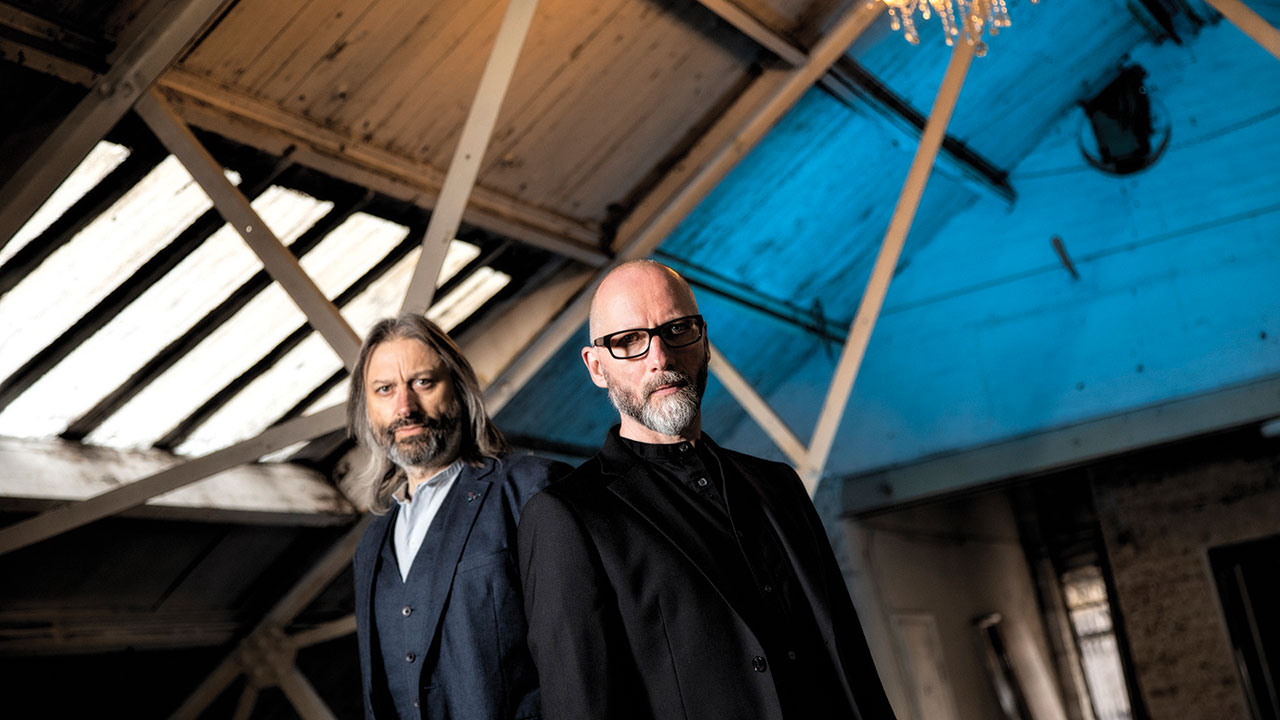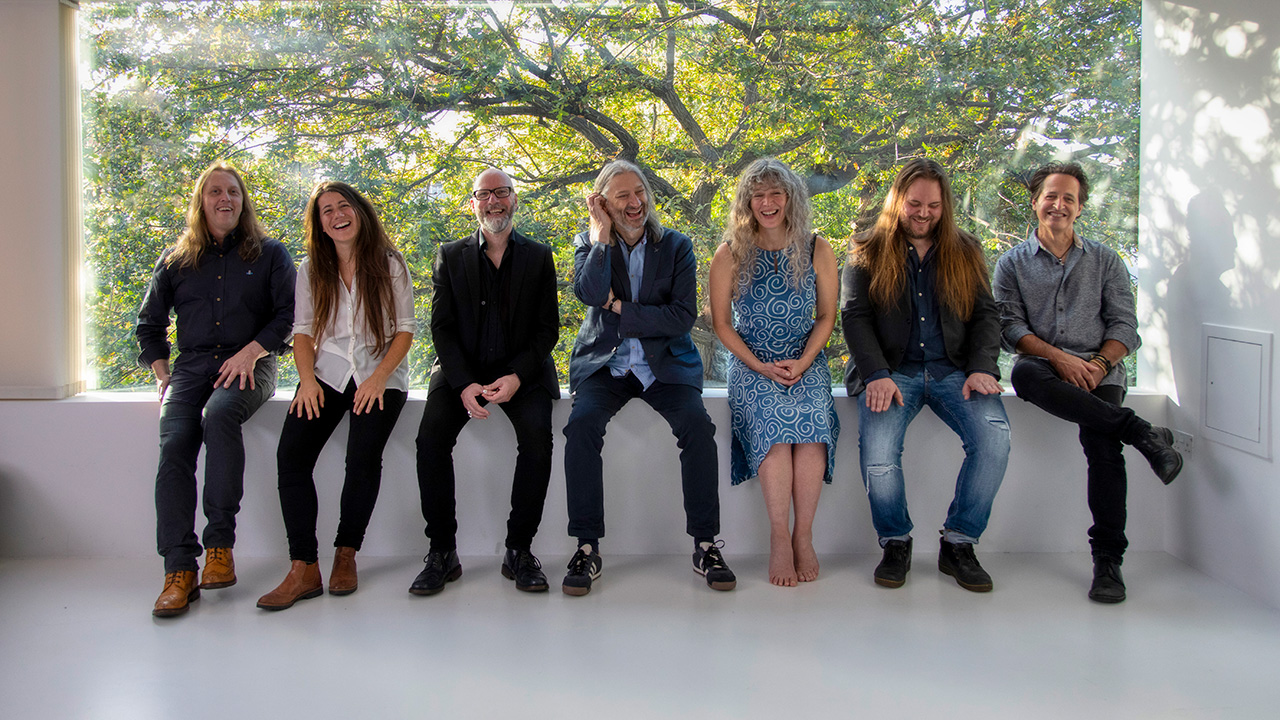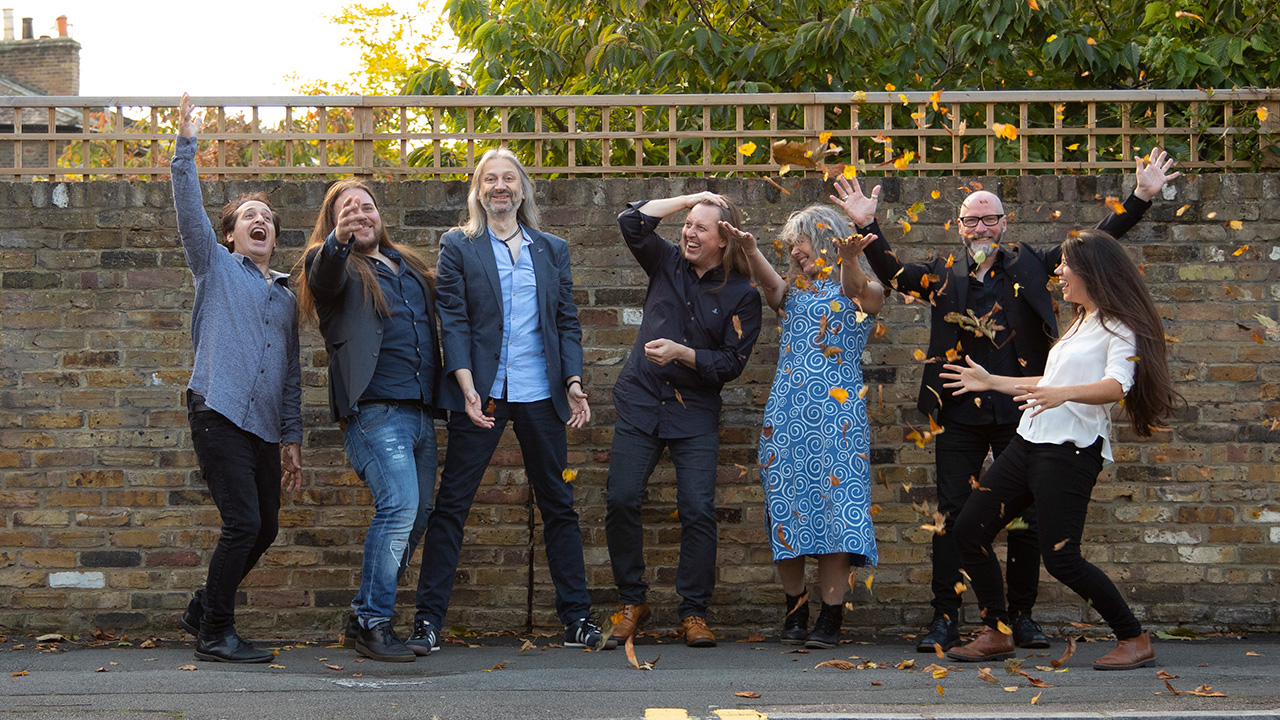
To paraphrase a time-honoured saying, some artists are born inspired. Some achieve inspiration, or strive successfully to find it. And some have inspiration thrust upon them. With Big Big Train, on their new album, Common Ground, it was a clear case of the latter. That much is obvious from the opening bars of the first track, The Strangest Times.
There’s little room for ambiguity or metaphor in its lyrics – they pretty much spell out how many of us were feeling in March 2020. ‘These are the strangest times…’ David Longdon sings over a propulsive piano-driven rock backing. ‘This world’s gone mad – we find ourselves in lockdown, trying to get the lowdown, from the PM’s 5pm address. Who could have guessed – these days are going to test us.’
For a band who have often drawn on history to relate tales of everything from art forgers to World War I flying aces and heroic train drivers, to have history happening in the moment, so close to all our homes, was, for David Longdon, too pressing a concern not to write about. So he quickly sounded out the band’s other principal songwriter.
“I spoke with Greg [Spawton],” Longdon explained in the PR material sent out for this record. “I said I couldn’t just be writing songs about historical figures and scenarios [this time]. I needed to write about the here and now.”
It set the tone for what Longdon feels is “an album of transition”. He adds, “We had the opportunity to reimagine what we do to a certain degree.”

That approach manifests itself in a collection of songs and instrumentals that noticeably lean more heavily on personal feelings rather than stories of fascinating figures, and a number of melodically and emotionally direct songs, which seem to chime with times where we’re all feeling less inclined to take for granted the people, the places and the experiences that mean most to us.
Nonetheless, as Greg Spawton tells Prog alongside Longdon on a joint Zoom call, “I didn’t want to throw out the baby with the bathwater. I thought we need to have a balance of new ideas and some more traditional storytelling stuff.”
Hence Common Ground also features a clutch of narrative-based songs, such as the 15-minute penultimate track Atlantic Cable, but more on that later. This combination is accompanied by a musical approach that sometimes paints with broad strokes, and at other times weaves the more complex instrumental tapestries Big Big Train fans have come to expect. It’s not so much a new Big Big Train sound, then, as a wider-ranging one.
Inevitably, though, there’s no doubt this will be seen as BBT’s “lockdown album”, and even if the sentiments of The Strangest Times end up sounding anachronistic quite quickly, that’s been no deterrent to them.
“I was just saying to Greg the other week that it probably will date,” Longdon says with a smile. “In fact we were saying to each other it’d be great when The Strangest Times feels like a period piece, when it’s all behind us.”
His lyrics evoke the turbulent feelings that gripped so many of us in the spring of last year – something it’s easy to forget when we’re all posting our second vaccination selfies on social media and looking forward to gigging again.
“It’s kind of easy to downplay it now,” says Longdon, “but the way the news was, the tabloids were screaming, the news was very doom-laden, the PM’s addresses were happening every day, people waiting to see what the government were going to do about this extraordinary situation. And we were told to be careful because some
of us were not going to make it. When The Strangest Times was written it was potentially the stuff of nightmares!”

Greg Spawton seconds those emotions. “It’s that uncertainty that still resonates for me more than anything else. Because we still don’t know if there’s going to be a third
wave or we’ll be plunged into more lockdowns. And that is a bit of a killer not just for musicians, but for all of us who are trying to get on with our lives.”
Dave Longdon’s mood was further affected by the fact that friends and family were also suffering, even if not directly from the new killer virus.
He was in the process of completing Dyble Longdon’s Between A Breath And A Breath, with former Fairport Convention singer Judy Dyble, having struck up a close friendship with the veteran folk songwriter when she guested on BBT’s 2017 album, Grimspound. Dyble was suffering from terminal lung cancer when they made the album, and coupled with other personal issues he had on his plate, Longdon didn’t feel able to write songs in his band’s usual historically detached style.
“It was a grim race to get the [Dyble Longdon] album finished,” he says, “so that we could sign it off, Judy and I, before she passed from this world, which is like, incredibly heavy! You’re working closely with somebody like that and, you know that this is going to be their last work. So everything’s infused with this huge poignancy. And even though we knew that she was terminally ill, her passing wasn’t any less… because of us knowing it was going to happen. It was horrendous. I spent so much time really working in forensic detail on this stuff, and then suddenly [clicks fingers] she’s gone.
“My mum has got vascular dementia, and that was all impacting around the same time as well. So I said to Greg, ‘I can’t really write the same way.’ I hadn’t got the mental bandwidth anymore, with everything that’s going on. Because those songs can take a lot of research.”
Instead, as suggested in The Strangest Times, he took to getting outdoors whenever he could. ‘I need to get out of this house, into the fields, by the brook then further on to the wood… to try and keep me sane.’
Ambitious plans in the autumn of last year, between lockdowns, to bring US-based drummer Nick D’Virgilio and Swedish guitarist Rikard Sjöblom to Peter Gabriel’s Real World Studios near Bath to record the album, inevitably ended up compromised by travel restrictions, but Longdon, from Nottinghamshire, and Bournemouth-based Spawton, still managed to record the building blocks of their compositions for the album alongside additional musicians Carly Bryant (vocals, keyboards, guitar), Dave Foster (guitar) and Aidan O’Rourke (violin).
The absence of two core members in the studio, though, didn’t prevent them from contributing compositionally and creatively to this record, albeit remotely. Sjöblom’s urgent piano figures drive The Strangest Times along, and he co-wrote the captivating piano instrumental Headwaters with Spawton as well as contributing some arresting guitar and piano work across the rest of the album.
D’Virgilio, meanwhile, might be best known as a percussion maestro, but his songwriting versatility is showcased impressively on this album with two sole writing credits. All The Love That We Can Give is a hymn to positivity and kindness that seems to follow thematically as the yang to the yin of The Strangest Times. ‘Decide to save another, make it right and love each other/Making the heart grow stronger’, the chorus goes, which seems to speak of the selflessness and community spirit that the past year’s travails have brought out in people. Turns out it’s a more general sentiment, but if the cap fits…
“It’s kind of his version of All You Need Is Love,” Spawton explains. “He’s speaking in general terms. He’s American, so he wouldn’t specifically have been thinking of the NHS, for instance, but I couldn’t agree more. A lot of this album is about trying to find the good in people, trying to do the best you can in difficult circumstances. I’m sorry if that sounds like a real hippie thing, but it is kind of a hippie album.”
“I’d like to put it on record,” says Longdon drily, “I’m not a hippie.”
If you say so, man, but the title track of the album reinforces that feeling, as Longdon’s tale of swearing romantic allegiance draws on more globally resonant notions of humanity having more that unites us than divides us.
Elbow’s heart-on-sleeve songcraft is an avowed influence on this record, and it’s audible in that instance, but in case all this suggests that more complex prog stylings have been ditched by BBT, major sections of the new album prove otherwise.
Apollo is the other Nick D’Virgilio composition, and he’s described it as an attempt to write “the quintessential Big Big Train instrumental”, influenced by Genesis’ Los Endos from A Trick Of The Tail. In this case it doesn’t end the album or reprise musical motifs from elsewhere on the LP, but forms something of an opener to side two, initially echoing the infectious chord structure of Jethro Tull’s Living In The Past before shooting off around the musical houses on a riveting eight-minute tour-de-force.
“Our hardcore fanbase seem scared shitless that we’re trying to become a pop band or something,” says Greg Spawton with a wry smile. “You know, some change of direction where they would lose their connection with the band. But me and David have both got a wide range of tastes – we’re not at all worried about writing more diversely than in the sort of 15-20- minute kind of epic thing. But we do like those as well. And Apollo is bloody tricky to play, I must say – the time signatures will catch you out if you’re not on top of things! I think that’s going to be a really fun live song for us to play. I can’t wait to try that one out in front of our fans.”

Elsewhere, Black With Ink is an archetypal, musically shape-shifting BBT song that uses the story of ancient libraries’ destruction to make a more timeless point about the importance of sharing knowledge. The aforementioned Atlantic Cable focuses on the curious tale of 19th century undersea wires being salvaged to provide the first inter-continental communications system. As well as its 15-minute duration allowing for numerous adventurous instrumental excursions, it touches lyrically on several wider themes found across the album.
“It’s a story about two continents coming together,” Spawton explains. “Suddenly communication goes from, like, a week or more to taking a matter of seconds or minutes, which was just a fascinating story for me. It chimes in with the album title and the cover image of this joining of hands across the world.”
That image also has further connotations to Longdon; “The notion of someone pulling someone else up – I like that about it. We all need help at times in our lives.”
Despite the grim circumstances of the pandemic that inspired its opening track, Common Ground is an overwhelmingly upbeat album overall, in contrast to the 21st century cultural trend towards the dark and dystopian.
That perhaps reflects the fact that when times are toughest, it’s natural to want to look towards the light rather than peer further into the abyss. And while the problems of a rock’n’roll band don’t amount to a hill of beans in this crazy world of ours in 2021, BBT also found themselves having to reassess their operations after the departure of four members in quick succession in recent years. Founder member Andy Poole signed off at the start of 2018, and then in March last year (ironically just before all gigging schedules had to be shelved), Dave Gregory stepped down, unable to commit to touring plans. Then a few months later, before recording for Common Ground began, keyboard player Danny Manners and violinist Rachel Hall departed to devote more time to their own projects.
“These have been testing times,” says Longdon, “in the sense that they have made people prioritise what they’ve been doing with their lives, and it made them re-evaluate, which can only be a good thing.”
With the band reduced to a core membership of four, that positive mental attitude had to show itself again.
“What was good was that it suddenly freed up a lot of space, sonically,” says Longdon. “And it allowed Rikard to be heard in all his glory, which is a mighty thing. He’s a talented guy and it’s really great to hear him stepping up and bringing it.
“Was it amicable? Yes, because we’ve been friends a long time. Just because they decided that they no longer want to be part of the band actively, it’s not like, ‘Well, I’ll never speak to you again!’ None of that rubbish.”
Spawton offers his thoughts: “The problem is primarily, until recently, we were a writing and recording band. We’re now heading into doing much more touring, and I think the point is for the three of them that left, all of them were thinking, ‘Do I really want to be spending months of my life on a tour bus?’ I’ve been the longest in the band and I was the wobbliest of all of us over last summer [after the last two had departed], because it felt a bit uncertain.”
“You do question the band’s future,” Longdon admits. “When one went and then another one, then another, we’re like, ‘Anybody else thinking of leaving?’ But then you think, ‘No, I love being in Big Big Train, I like working with Greg, we’re really good friends, we enjoy the music we make and we have a great laugh making it.’ So I didn’t want that to end anytime soon.”
“As things felt like they were falling apart,” Spawton recalls, “Rikard said, ‘Guys, there’s still the core four of us. We’re all writers, let’s get on with it!’”
Longdon: “And at that point it’s like a real rallying cry. We said, ‘All in!’”
Spawton: “It was like the four musketeers, wasn’t it? We all put our swords in the middle… we’re a close-knit bunch anyway, but it’s really brought us closer together.”
Since that enforced reduction in numbers, the band have been bolstered by the introduction of four new musicians; three worked on the album, and three of whom are set to join Big Big Train on live dates.
“It’s probably an understatement to say we’ve been through some ups and downs,” Spawton admits, “as a band, as people, and obviously in a wider sense, as a society. Hopefully, we’re now coming out of the down period and we’re back on the up.”
The new album certainly suggests so. With live shows rescheduled for 2022 we might have to wait a little longer for our delayed gratification, but of all our common ground this is the kind we’re most looking forward to sharing with them.
This article originally appeared in issue 121 of Prog Magazine.







